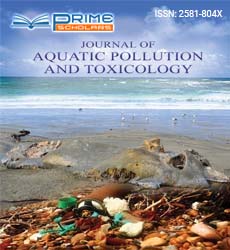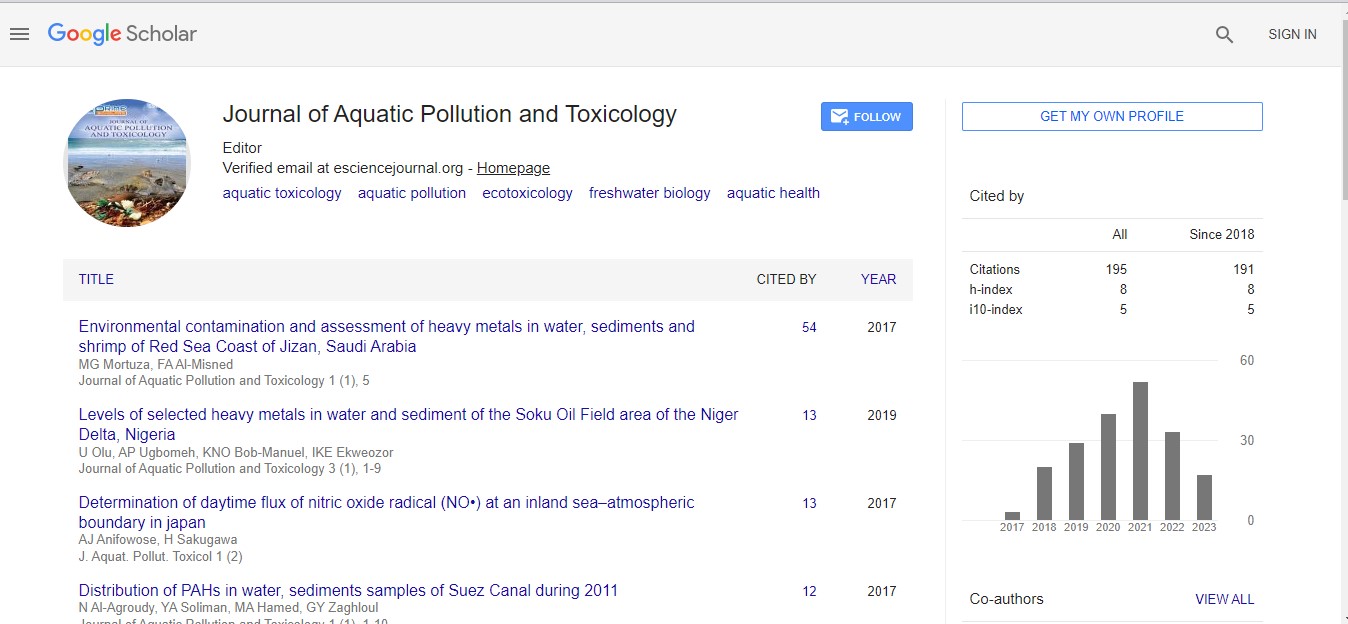Commentary - (2023) Volume 7, Issue 3
Ecotoxicology: Exploring the Impact of Chemicals on Ecosystems
Tristen Scott*
Department of Oceanography Sciences, Carnegie Mellon University, USA
*Correspondence:
Tristen Scott,
Department of Oceanography Sciences, Carnegie Mellon University,
USA,
Email:
Received: 30-Aug-2023, Manuscript No. IPJAPT-23-18231;
Editor assigned: 01-Sep-2023, Pre QC No. IPJAPT-23-18231 (PQ);
Reviewed: 15-Sep-2023, QC No. IPJAPT-23-18231;
Revised: 20-Sep-2023, Manuscript No. IPJAPT-23-18231 (R);
Published:
27-Sep-2023, DOI: 10.21767/2581-804X-7.3.25
Description
Ecotoxicology is a branch of environmental science that delves
into the intricate relationship between chemicals, their impact
on ecosystems, and the implications for both wildlife and human
health. This multifaceted discipline seeks to understand
how various contaminants, from pesticides to industrial chemicals,
affect the natural world, emphasizing the vital role of
studying these interactions in maintaining ecological balance.
In this article, we will explore the significance, methodologies,
and key findings in ecotoxicology. Ecotoxicology, at its core, is
the science of understanding how various chemical substances,
including pollutants and pesticides, influence ecosystems
and the living organisms within them. It examines the complex
interactions between chemicals and the environment, identifying
potential risks and developing strategies for mitigating
harm. Assess the impact of contaminants on wildlife and ecosystems.
Predict the fate and behavior of contaminants in the
environment. Develop strategies for environmental protection
and sustainable resource management. Provide valuable
data for regulatory decisions on chemical safety. Controlled
experiments in the laboratory allow scientists to investigate
the effects of chemicals on specific species under controlled
conditions. These studies can provide valuable insights into the
toxicity of chemicals and their mechanisms of action. Ecotoxicologists
also conduct studies in natural ecosystems, where
factors like temperature, humidity, and predation can significantly
impact the effects of chemicals on wildlife and the environment.
Field studies provide real-world data on how contaminants
affect ecosystems. This process evaluates the potential
risks of a chemical or contaminant on an ecosystem. It includes
identifying the sources of exposure, assessing the ecological
effects, and characterizing the risk to the environment. This
approach involves the use of living organisms, often indicator
species, to assess the health of an ecosystem. Changes in the
health and behavior of these organisms can indicate the presence
of contaminants. Ecotoxicological research has revealed
the harmful effects of certain pesticides, particularly neonicotinoids,
on pollinators like bees. These chemicals can impair the
ability of pollinators to forage, navigate, and reproduce, posing
a significant threat to food security and ecosystem stability.
The field of ecotoxicology has uncovered the disruptive effects
of endocrine-disrupting chemicals (EDCs) on wildlife and humans.
These substances can interfere with hormone systems
and lead to adverse health effects in both wildlife and people.
Many aquatic ecosystems have been profoundly affected
by contaminants, such as heavy metals, industrial chemicals,
and pharmaceuticals. Ecotoxicological research has highlighted
the widespread contamination of water bodies and studies in
ecotoxicology have shown how certain contaminants can bioaccumulate
in food chains, with top predators accumulating
higher concentrations of harmful substances. This phenomenon
poses risks not only to wildlife but also to human consumers
of contaminated seafood. Ecotoxicologists are increasingly
studying the interaction between contaminants and climate
change. Rising temperatures and altered weather patterns can
affect the behavior, distribution, and toxicity of chemicals in
the environment. Ecotoxicology is fundamental to understanding
and preserving the health of ecosystems. By assessing the
impacts of contaminants on biodiversity and ecosystem function,
it helps identify and mitigate threats to the environment.
The discipline has far-reaching implications for human health,
as many contaminants, if not managed properly, can find their
way into the food we consume and the water we drink. Studying
ecotoxicology helps safeguard human health by identifying
potential risks. Ecotoxicological research provides the scientific
foundation for policies and regulations governing chemical
safety, emissions, and waste management. This helps prevent
or minimize environmental contamination.
Acknowledgement
None.
Conflict Of Interest
The author declares there is no conflict of interest in publishing
this article.
Citation: Scott T (2023) Ecotoxicology: Exploring the Impact of Chemicals on Ecosystems. J Aquat Pollut Toxicol. 7:25
Copyright: © 2023 Scott T. This is an open-access article distributed under the terms of the Creative Commons Attribution License, which permits unrestricted use, distribution, and reproduction in any medium, provided the original author and source are credited.

